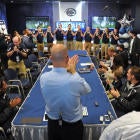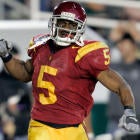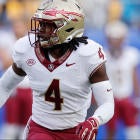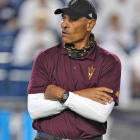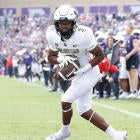Before fake news on social media became a big deal, there was fake recruiting on National Signing Day. College football's elaborate circus known as signing day jumped the shark for me in 2008 when Kevin Hart, a no-name offensive lineman from Nevada, held a news conference to announce he would play football at California.
Hundreds of people, including Hart's parents, high school coach, teachers and friends, packed a high school gym and believed what they saw. Hart laid the groundwork for a while, even telling his high school newspaper that Nevada, Boise State, Washington, Oregon, California and Oregon State were recruiting him.
None of it was true. There was no offer from Cal. Hart got caught in his lies and became publicly humiliated. He spent four years at Feather River College before signing with Division II Missouri Western State. A 2013 story from the St. Joseph News-Press reported Hart left school after his redshirt season to be closer to his family.
The story of Hart was an outlier in the crazy world of college football recruiting. Still, each year we hear something wild, whether it's recruits and parents faxing letters of intent to different schools, parents forging their child's signature, or a media member concocting a plan for a recruit to double-cross his committed school. I have long felt Hart's story should have made college football pause from feeding the beast for a minute to consider what coaches, players, families and media created.
All of this is to say maybe -- hopefully -- Wednesday marks the last time signing day means way too much. Maybe we can all turn the temperature down a little bit.
An early signing period in mid-December is likely coming, allowing players to end this nonsense six weeks earlier if they so choose. This could be the last time so many eyeballs are watching the first Wednesday in February to learn where 17- and 18-year-olds will attend college.
Swooning over recruits has always reminded me of Jerry Seinfeld's observation of pro sports. Given how frequently players leave teams, cheering for pro teams amounts to rooting for laundry.
Except, in college football, you aren't simply rooting for laundry. You're rooting for hormones.
You're hoping hormones honor commitments. You're hoping hormones don't get in trouble. You're hoping hormones live up to the hype at a time when teenagers typically aren't physically or emotionally mature yet.
"I already think this recruiting process is too hyped for guys to where they come to college and forget how to work," Washington linebacker Keishawn Bierria said. "'I'm the No. 1 guy in the country. I'm good.' Nah, you're not good. Now you've got to build from the bottom. Nothing is going to be given to you.
"I feel like media should take a step back from the recruiting process because that pushes a lot of guys out there who deserve it, and it hypes a lot of guys up who don't deserve it. Stop calling guys every day: 'You just got this offer, this offer, this offer. You're amazing.' Nah, man. That's high school. That's totally different when you get to college and that really destroys some guys' mindsets. They feel like they're in high school and they deserve it all and they've already won a national championship."
I still have concerns on what happens to recruits who sign early and want out if their head coach and/or assistant end up leaving later in December or January. While the early signing date will undoubtedly help many recruits, I'm not yet entirely sold it will benefit enough of them.
The pressures felt in recruiting will still exist and likely shift to different dates. Coaches aren't going to stop intensely recruiting players, nor will parents and kids stop chasing scholarships or the media covering these developments. Problems that publicly surface on signing day may just play out earlier in the process.
The earlier signing date could better clarify what a commitment actually means. Maybe it helps alleviate the confusing and troubling cases every year when a coach yanks a scholarship offer to a committed player very late, such as Michigan's Jim Harbaugh and Randy Edsall in recent seasons.
"I think it's going to slow [recruiting] down big time," Clemson coach Dabo Swinney said. "You're going to see some of these early offers slow down because if a guy is committed, you're going to expect them to sign so you better be sure you're offering someone you want."
Early signing isn't a perfect solution to the circus that is recruiting. Not many people seem ready for a more radical idea of letting a player sign when he commits, no matter the date. Washington coach Chris Petersen views late November as the worst time for high school players.
"That's when the vultures come back out there," Petersen said. "These kids have been committed for six months or a year, and then [coaches] get with them and they rattle their cage really in this two-week period. That's where I think a lot of time and money is being wasted. I think that two weeks is a painful time for them. You have to go out and babysit those kids."
Big 12 commissioner Bob Bowlsby, who chairs the NCAA Football Oversight Committee, said he still thinks December is not early enough for the first signing period and questions why signing dates are even needed.
"Why don't we have signing windows, or why don't we have longer signing periods?" Bowlsby said. "For instance, you could have a signing period that starts the first of September and you issue a letter of intent for 14 days, and if the prospect signs it, their recruiting process is over. If they don't sign it, you can't re-issue a letter to that person. It's sort of mutually binding -- as a commitment is supposed to be."
Under the early-signing period proposal, schools could hold official visits for recruits between April and June of their junior year of high school. Right now, official visits can't start until Sept. 1 of the recruit's senior year of high school. Schools that struggle to draw unofficial visits from recruits will get helped by meeting players earlier.
"We've kind of gotten some things backwards and kids making commitments before they even made official visits, which seems nonsensical," MAC commissioner Jon Steinbrecher said.
Whether the sense of entitlement for some recruits changes is debatable. After all, signing day is still the one time they have the most leverage over the entire system of unpaid "amateur" athletics.
Entitlement is nothing new. Who can forget quarterback Jimmy Clausen stepping out of a stretch Hummer limousine in 2006 to commit to Notre Dame at the College Football Hall of Fame? What dramatically changed in recruiting was technology, which brought coaches, fans and reporters closer together than ever before to recruits while creating more opportunities and risks.
Suddenly, money got made reporting on where players will take visits after recruiting had been woefully under-reported in the media. Coaches gained instant access to video of players and contacted them through text messages instead of snail mail. Fans reached out directly to recruits on social media to praise or ridicule them -- the evolution from the days when message boards were the sole home of negative comments about recruits.
"I stayed away from [the message boards], but my family could not stay away from it," former Florida State All-American safety Myron Rolle said about his recruitment in the mid-2000s. "They were so protective of me and they'd go on these message boards and hear what these fans said about me -- positive or negative -- and they would react to it. Sometimes, they would create a screen name and try to defend my honor. I'm like, 'That's not going to help or change anything. Just let it go.'"
Somewhere along the way, signing day became a holiday. Maybe this traces to 2002, when running back Lorenzo Booker was the nation's No. 1 recruit and became the first high school star to announce his college choice on ESPN.
"When I look at these kids on TV now, it's like they can't wait to do it," Booker recalled to the Tallahassee Democrat this week. "They're so excited to do it. And it was literally the exact opposite for me."
Until a few minutes before his announcement on national TV, Booker was confused between Notre Dame and Florida State. Booker said his cousin even told him if he's not ready that he could inform ESPN he's not signing that day. He went ahead and later expressed no regrets with his choice.
Rolle remembers watching Booker's announcement and wanting a TV event once he became a high school senior. When Rolle announced for Florida State in 2006 as ESPN's first No. 1 recruit, he did it on TV from the Trump Plaza Hotel and Casino in Atlantic City, New Jersey, where his mother worked.
Today, Rolle is amazed seeing recruits post teasers on Instagram about where they might attend college. This then draws thousands of comments from fans begging the recruit to attend their school.
"I think it really, really distorts the view of these players if you're not humbled and grounded and don't have a good work ethic to start with," said Rolle, who is about to become a neurosurgeon after passing on the NFL in 2009 to study as a Rhodes Scholar.
As long as recruits don't trick people, Rolle is OK with elaborate announcements. "I get people may think that may be unprofessional, but I'm a firm believer in self-expression and self-creativity and taking advantage of a time you worked very hard for," he said. "Allow them to celebrate in their achievement how they want it to be done, as long as it's not done with poor taste."
This brings me back to Kevin Hart, the made-up recruit who had no achievement to celebrate since he lacked the grades or talent to play major college football. Hart told ESPN in 2009 he didn't even take the SATs while in high school because he knew his grades weren't good enough.
"I kept it to myself," Hart said in 2009. "I was embarrassed because, like, I wanted to live up to everyone's expectations and couldn't deal with people at the time knowing that I failed. I just wanted to be someone, and when I couldn't be that person, it was tough, and I didn't know how to really explain that to people or tell people that."
I think of Kevin Hart every National Signing Day, but not to laugh as many still do in stories about the wildest recruiting tales. I wonder what his story says about college football recruiting given that Hart put so much effort into a lie that was unobtainable.
I reached out this week to Hart to find out how he's doing. His Twitter account is protected. He called me back to politely and understandably say he no longer does interviews because he keeps his life private.
"I just don't talk about it anymore," Hart said. "I'm not trying to be rude or anything. I try to put it behind me and move on."
In life, as in recruiting, sometimes "no comment" is the best answer.












